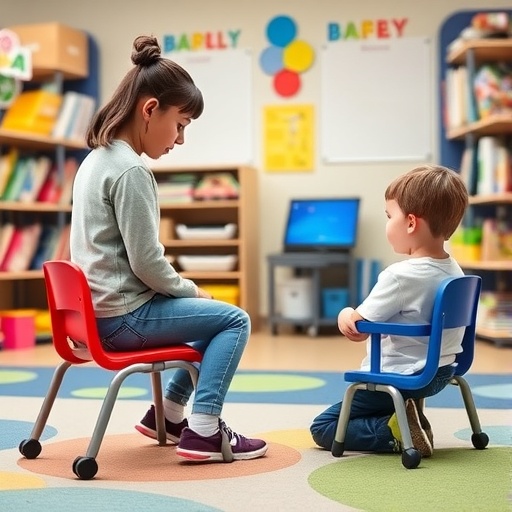In a groundbreaking study conducted by Cemali, Cimilli, Alataş, and colleagues, the focus is placed on the ergonomic design of special education kindergartens specifically tailored for children with special needs. This research uncovers vital insights into how the physical environment of educational institutions can significantly impact the learning and developmental outcomes for these children. With the increasing recognition of the importance of inclusive education, understanding the ergonomic elements that enhance learning experiences is crucial.
The study underscores that the learning environment is not merely about the curriculum but also significantly influenced by the physical layout and ergonomic features of the classroom. Ergonomics, a science devoted to understanding human interaction with objects and environments, plays a crucial role in educational settings, particularly for children requiring special education services. The researchers conducted a pilot study that analyzed various aspects of a special education kindergarten, shedding light on the elements that contribute to an effective learning environment.
One key finding of the study highlights the importance of furniture design in special education environments. Conventional desks and chairs may not accommodate the diverse needs of children with varying physical and cognitive abilities. The researchers advocate for adjustable furniture, which can cater to different body sizes and postures, allowing children to engage more comfortably with their learning materials. This flexibility promotes better focus and concentration, essential components in educational success.
Moreover, the spatial arrangement within classrooms is also a focal point of this research. The study suggests that open, airy spaces greatly enhance children’s mobility and sense of freedom. In contrast, cramped and cluttered environments can create barriers to movement, inhibiting participation in group activities and thereby affecting social development. These insights lead to a recommendation for designing kindergartens that provide ample space for movement and interaction.
In addition to physical space and furniture, the study emphasizes the role of sensory aspects in classroom environments. The incorporation of varied textures, colors, and sounds can serve as powerful tools in engaging young learners. Sensory stimulation is particularly important for children with sensory processing disorders, who often require tailored environments to thrive educationally. The research delves into designing sensory-friendly zones that support these children, promoting exploration and learning.
Light quality is another crucial factor addressed by the researchers. Studies have revealed that natural light can improve mood and increase concentration levels amongst students. The pilot study suggests that classrooms should maximize natural light while minimizing glare and harsh artificial lighting. Such environmental considerations can contribute significantly to enhancing the educational experiences of children in special education.
The findings of the pilot study not only provide a framework for future designs but also pose essential questions regarding funding and resources for such modifications. Many special education facilities operate under tight budgets, and prioritizing ergonomic designs may seem an overwhelming task. The researchers encourage policymakers to consider the long-term benefits of investing in ergonomically sound educational facilities to ensure that children with special needs receive the education they deserve.
Feedback from teachers and special education professionals played a vital role in this study, as their opinions provide invaluable perspectives on the practical aspects of classroom design. Many educators noted that when classrooms are tailored to meet the unique needs of their students, it fosters a more inclusive and dynamic learning environment. Creating spaces that empower teachers to implement their pedagogical skills effectively can revolutionize educational practices.
The research also touches on the larger implications of ergonomics in education, suggesting that these considerations can be applied to various educational levels. The findings from this kindergarten-focused study could inform designs not only for special education institutions but for mainstream schools looking to incorporate inclusive education principles. As education evolves, the integration of ergonomic design principles may become a standard practice.
While the pilot study represents an initial step toward understanding these complex dynamics, further research is needed to explore long-term outcomes related to ergonomic adjustments in special education settings. The implications for cognitive and emotional development in children, as well as their overall academic success, remain topics for future investigation.
The potential impact of these insights extends beyond the confines of classrooms. Communities can benefit significantly when children are educated in environments designed with their specific needs in mind. As children with special needs emerge into society as informed, active participants, the reverberations of inclusive and thoughtful educational design will echo within communities.
In summary, the findings from this significant research provide a compelling argument for the integration of ergonomic principles in special education kindergarten classrooms. As society continues to push for inclusivity and equal access to education, recognizing the importance of the learning environment itself is critical. The combination of thoughtful design, knowledge of students’ needs, and a commitment to fostering positive learning experiences can lead to meaningful, lasting change in the lives of children with special needs.
As we await the formal publication of the full study, educators, policymakers, and the broader society would do well to reflect on the necessity of creating conducive educational environments for all learners, with particular attention to those who require specialized support.
Subject of Research: Ergonomic design in special education kindergartens for children with special needs.
Article Title: Ergonomic suitability of special education kindergarten for children with special needs: pilot school example.
Article References:
Cemali, M., Cimilli, E., Alataş, D.M. et al. Ergonomic suitability of special education kindergarten for children with special needs: pilot school example.
BMC Pediatr 25, 885 (2025). https://doi.org/10.1186/s12887-025-06317-w
Image Credits: AI Generated
DOI: 10.1186/s12887-025-06317-w
Keywords: Ergonomics, special education, classroom design, inclusive education, learning environment, sensory processing, children’s development.
Tags: adjustable furniture for special needschildren’s learning outcomeseducational environment designergonomic design in special educationfurniture design for diverse abilitieshuman-environment interactionimpact of classroom ergonomicsinclusive education environmentsoptimizing learning for special needsphysical layout in classroomspilot study on classroom ergonomicsspecial needs kindergarten assessment





